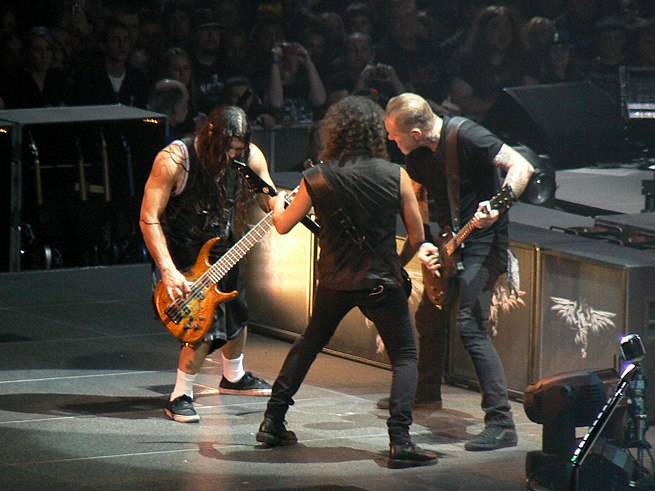
-
Band (noun)
A strip of material used for strengthening or coupling.
-
Band (noun)
A strip of material wrapped around things to hold them together.
-
Band (noun)
A narrow strip of cloth or other material on clothing, to bind, strengthen, or ornament it.
-
Band (noun)
A strip along the spine of a book where the pages are attached.
-
Band (noun)
A long strip of material, color, etc, that is different from the surrounding area.
“sandstone with bands of shale”
-
Band (noun)
A strip of decoration.
-
Band (noun)
A belt or strap that is part of a machine.
-
Band (noun)
A continuous tablet, stripe, or series of ornaments, as of carved foliage, of colour, or of brickwork.
-
Band (noun)
That which serves as the means of union or connection between persons; a tie.
-
Band (noun)
A linen collar or ruff worn in the 16th and 17th centuries.
-
Band (noun)
Two strips of linen hanging from the neck in front as part of a clerical, legal, or academic dress.
-
Band (noun)
A part of the electromagnetic spectrum.
-
Band (noun)
A group of energy levels in a solid state material.
“valence band;”
“conduction band”
-
Band (noun)
A bond.
-
Band (noun)
Pledge; security.
-
Band (noun)
A ring, such as a wedding ring (wedding band), or a ring put on a bird’s leg to identify it.
-
Band (noun)
Any distinguishing line formed by chromatography, electrophoresis etc
-
Band (noun)
A wad of money totaling $10K, held together by a band; money
-
Band (noun)
A group of musicians who perform together as an ensemble, usually for a professional recording artist.
-
Band (noun)
A type of orchestra originally playing janissary music.
-
Band (noun)
A marching band.
-
Band (noun)
A group of people loosely united for a common purpose a band of thieves.
-
Band (noun)
A small group of people living in a simple society.
-
Band (noun)
A group of aboriginals that has official recognition as an organized unit by the federal government of Canada.
-
Band (verb)
To fasten with a band.
-
Band (verb)
To fasten an identifying band around the leg of (a bird).
-
Band (verb)
To group together for a common purpose; to confederate.
-
Group (noun)
A number of things or persons being in some relation to one another.
“there is a group of houses behind the hill;”
“he left town to join a Communist group”
“A group of people gathered in front of the Parliament to demonstrate against the Prime Minister’s proposals.”
-
Group (noun)
A set with an associative binary operation, under which there exists an identity element, and such that each element has an inverse.
-
Group (noun)
An effective divisor on a curve.
-
Group (noun)
A (usually small) group of people who perform music together.
“Did you see the new jazz group?”
-
Group (noun)
A small number (up to about fifty) of galaxies that are near each other.
-
Group (noun)
A column in the periodic table of chemical elements.
-
Group (noun)
A functional group.
“Nitro is an electron-withdrawing group.”
-
Group (noun)
A subset of a culture or of a society.
-
Group (noun)
An air force formation.
-
Group (noun)
A collection of formations or rock strata.
-
Group (noun)
A number of users with same rights with respect to accession, modification, and execution of files, computers and peripherals.
-
Group (noun)
An element of an espresso machine from which hot water pours into the portafilter.
-
Group (noun)
A number of eighth, sixteenth, etc., notes joined at the stems; sometimes rather indefinitely applied to any ornament made up of a few short notes.
-
Group (noun)
A set of teams playing each other in the same division, while not during the same period playing any teams that belong to other sets in the division.
-
Group (noun)
A commercial organization.
-
Group (verb)
To put together to form a group.
“group the dogs by hair colour”
-
Group (verb)
To come together to form a group.
